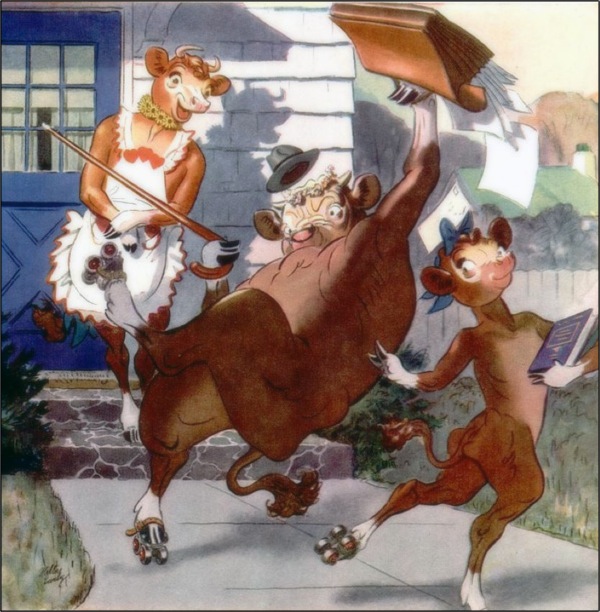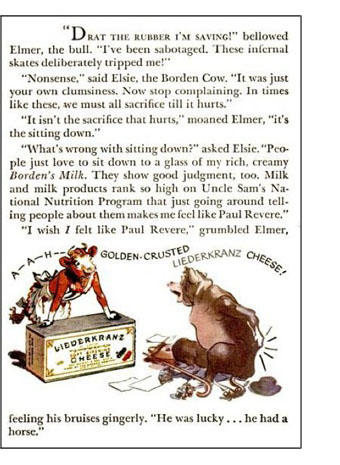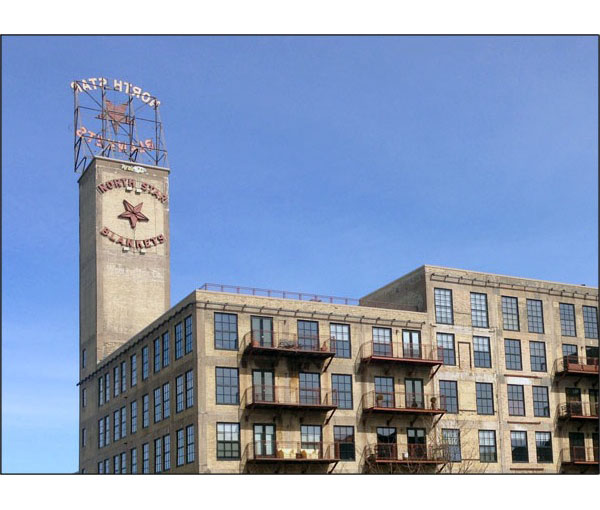They're coming down.

The medallions. The front of the newspaper building has six carved medallions depicting the bounty of Minnesota. One has the head of a cow. We might be the only newpaper in the country with a large cow head protruding from the building. I was worried that they'd all be pried off today, but they were just taking a look to see how to get them off. The last thing you want to do is pull out a few screws and down it goes and CRASH and, err, ooops.
It was 54 today, which was remarkable. It will not be 54 tomorrow, which is disappoiting. It will not be 54 for the rest of the week, which is depressing. It's supposed to snow next Monday, which they tell us well in advance to keep anyone from thinking today meant anything.
I walked around and was reminded that my boots are not waterproof. I don't know why I thought they were. Because they're boots? A common error if you called galoshes "boots" as a kid, which we did. Also "overshoes," which is a strange term, when you think about it. They are over-shoes. But they are shoes. They do not make your shoes under-shoes. The "shoes" part gets lost when you make it one word - overchuuss. The "Sh" sound is apt for sloppy days when you're kicking through slush. I'm rambling. But: I did some some little kids jumping up and down on sidewalk ice today, cracking it and scattering the shards.
One of the great early pleasures of life you ought never to outgrow.
Anyway: you'll have to forgive me for this week; I know I've said this before, but I am finishing the novel. The third revision is but days away from completion, and it's taken over my head again. Best of all: I like it.
Article in the Guardian:
If you've ever spoken with an American, likely one of the first questions they asked you was "what do you do?"
In the US, we're obsessed with people's jobs.
No, we’re not. Some people are interested in what other people do for a living. We’re not obsessed. The word ought to mean an unhealthy interest that consumes one’s eery waking hour; instead t’s use by people to elevate their own interests into something more, well, interesting: I’m obsessed with finding the proper type of gardening twine! or I’m obsessed with collecting vintage salt-and-pepper shakers in animal shapes! Okay. The word is also used to denigrate other people whose interest in a subject exceeds what you think is acceptable.
Don’t get me started on “passionate.”
We want to know all about it. We insist that you tell us what "career tribe" you're in – white collar, blue collar or new high-techy collar.
No, we don’t. We as a nation, do not insist on knowing anything of the sort, especially using the horrid term “career tribe.” No one ever says “so that job you just mentioned, it’s blue collar?”
What's your exact title? How do you spend your day? Are you someone speaks the language of law, tech, finance, media, marketing, education, military, government, the arts, etc?
Who the hell is she talking about? What’s your exact title? No one ever asks that.
Basically, we would like everyone to walk around with their business card attached to their forehead, but since that's a bit over-the-top, we try to glean the same information by asking questions – often lots of them – about your work.
It’s called “small talk in social gatherings.”
Now, enter the sociologist to apply Science! to the situation:
“People in their 20s and 30s are starting to give up on work as a primary way to center or ground their identity. You can't define yourself by work when you don't know if you're going to be employed," says Dr Jennifer Silva, a sociologist and author of Coming Up Short: Working-Class Adulthood in an Age of Uncertainty.
She did in depth interviews with a hundred Millennials to try to understand how they are shaping their lives in this environment. One question she asked as part of her research was the simple: "who are you?" Three-quarters of the young adults she spoke with didn't mention work at all in their response. Instead, they would emphasize what Dr Silva calls "narratives of personal growth" such as feeling they had matured in a relationship with a relative or lover or had some sort of self-discovery.
You can understand why people ask about jobs, because no one wants to sit next to a stranger at dinner and hear about their self-discovery. It’s also not surprising that people in their 20s don’t include “work” in their identity, since the jobs you get in your 20s aren’t positions that match what you want to do.
By the way, I really want to write a book titled "This isn't the Title: Post-Colon Explanations in Modern Non-Fiction."




The weekly Borden: Elsie’s so proud of Beulah - as usual - that she doesn’t even notice her husband is about to suffer a concussion. Or she just finds it hilarious.


 |
Elsie’s happy because everyone is saving rubber, and minimizing war-time wear on your auto was one of the means by which Tojo would be ground into the mud of history. Elmer has been shamed into skating, and suffered the usual result. Papers spill out of his briefcase, which makes you wonder once more: what does he do, exactly? What does he do?
Elsie babbles her Borden spiel as expected, but it makes little sense and the connections seem tenuous. “What’s wrong with sitting down? People like to sit down with milk!” Yes, that’s a common statement around most households. Let us sit down and have milk. The reason Elmer complains about the discomfort of sitting isn’t fanciful; he has burst innumerable capillaries and his tissues are inflamed. It’s a reasonable thing to say.
We also learn that horses are not like cows in this world. They do not own houses or hold down office jobs. |
COZY
It’s her special day!



And that means a gift from her alarmingly dull-witted son and happy husband, who’s about to tip over the coffee pot and scald everyone. She’s well-rested, though - and do you know why?



Yes, Beautynap Blankets, the blankets that help you rise more attractive than you were when you voluntarily surrendered consciousness. They came from Minneapoli, andbBy 1925 they were the largest wool blanket maker in the country. Makes sense. It’s cold up here.

The sign has adorned the skyline for decades. The riverfront factory sat empty for almost half a century, which shows you how much activity there was down by the Mississippi. It’s condos now.
YUM
Another Minnesota company:



Sno-Sheen was a cake flour, since dropped; Farina seems to have a picture of a kid who realizes he’s going to get Farina.
LOAF
Meanwhile, down in Iowa: another Spam Pretender.



LOAF is an unfortunate word for food, according to my daughter. Liver Loaf does not bring them running to the table these days. Tongue Loaf makes them sneak out the back door. TONGUE LOAF. It’s tongue that’s been loafed by their patented process, no doubt.
It’s now a big company - sorry, a Food Group - that includes once-rival Armour, among others. The company goes back to England, where George Morell got in the food business selling oranges in open-air markets, then moved on to curing hams. He has a passion for them, we’re told. I doubt it. A pecuniary interest, yes. Passion? He would scoff at the word. Anyway, the Morell Food Group is owned by Smithfield, which recently merged with a Chinese firm, WH Group Limited. From their site:
The WH Group name is derived from “Wanzhou Holdings” where the Chinese characters “Wan” and “Zhou” connote eternity and continents respectively, while the WH Group logo design depicts four streams representing the Earth’s four major oceans, separating the space into five parts to represent the world’s continents.
It’s a long way from one guy selling oranges in England.
LAWDY
Is what she used to say in the ads. Interesting box:



Look at the bag - hand drawn, with the color intentionally off the mark. It's a bit of a mess, but you can see them trying to put together a new modern look that has more graphic pizzazz.
NEW FRESH TASTE
Finally, a bygone snack:



Wonder if anyone said "boy, you can really taste the celery."


Usual usual here and there; see you around.
|